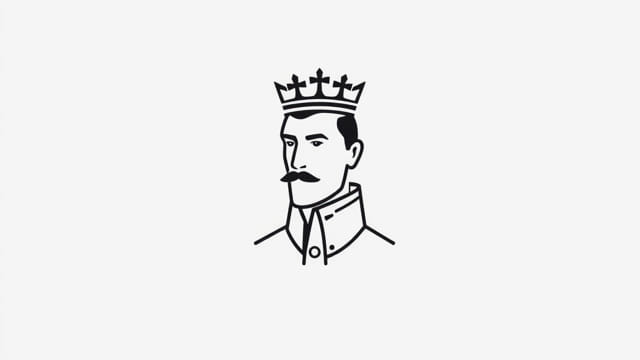Karl Anton, Prince of Hohenzollern, was a significant figure in 19th-century European politics, serving both as a member of the Prussian royal family and as a powerful noble in the House of Hohenzollern-Sigmaringen. Born into a time of political upheaval and dynastic intrigue, his influence extended beyond the borders of his principality and into the wider sphere of German and European statecraft. His legacy is particularly important for understanding the transition of Germany from a collection of principalities into a unified empire, as well as the role his family played in Romanian history.
Early Life and Family Background
The Hohenzollern Lineage
Karl Anton was born on September 7, 1811, in Sigmaringen, a town located in the present-day state of Baden-Württemberg, Germany. He was a member of the Swabian branch of the Hohenzollern dynasty, a family that also produced the kings of Prussia and emperors of Germany. His father, Karl, Prince of Hohenzollern-Sigmaringen, ruled the principality at a time when German territories were still fragmented and heavily influenced by larger powers such as Austria and France.
Marriage and Dynastic Alliances
In 1834, Karl Anton married Princess Josephine of Baden, a move that further solidified his ties with influential noble houses across Germany and beyond. This marriage produced several children, most notably Carol I of Romania, who would later become a monarch and establish the Hohenzollern-Sigmaringen line in Eastern Europe. Through his children, Karl Anton’s lineage would have lasting impact on European royalty.
Political Career and Governance
Prince of Hohenzollern-Sigmaringen
Karl Anton became Prince of Hohenzollern-Sigmaringen in 1848, during a period of widespread revolution across Europe. Recognizing the instability and potential threats to his small state, he made the bold decision in 1849 to abdicate the sovereignty of his principality and place it under the protection of the Kingdom of Prussia. This move effectively ended the independence of Hohenzollern-Sigmaringen but ensured the preservation of his family’s status and security.
Prime Minister of Prussia
One of the most important roles Karl Anton played was as Prime Minister of Prussia. He served in this position from 1858 to 1862 under King Wilhelm I. His term is notable for taking place during the so-called ‘New Era,’ a time when liberal elements in Prussia attempted to modernize the kingdom’s institutions and policies. However, his efforts at reform were limited, and he ultimately resigned, making way for Otto von Bismarck, who would later lead the unification of Germany.
Contribution to Romanian Monarchy
Father of King Carol I
Karl Anton’s son, Carol, was elected as the ruling prince of Romania in 1866 and later crowned as King Carol I in 1881. This move introduced the Hohenzollern-Sigmaringen family into the leadership of a sovereign nation in Eastern Europe. It was a monumental step that not only influenced Romanian politics and modernization but also created new dynastic links between Western and Eastern Europe.
Diplomatic Implications
Karl Anton’s role in this transition was significant, as he used his political experience and connections to support his son’s reign and ensure a smooth transition of power. The election of a German prince to a foreign throne had wide-reaching diplomatic implications, particularly in terms of balancing power between Austria, Russia, and the Ottoman Empire, all of whom had vested interests in the Balkans.
Legacy and Historical Significance
A Bridge Between Old and New
Karl Anton is best remembered as a transitional figure who bridged the old feudal order and the emerging modern state systems of Europe. His willingness to abdicate his sovereignty in favor of greater political unity set an example for other minor states during the 19th century and demonstrated a forward-thinking approach to governance.
Architect of Dynastic Strategy
Through strategic marriages and diplomatic negotiations, he elevated the status of the Hohenzollern-Sigmaringen family far beyond its original territory. His success in placing his son on the Romanian throne is seen as one of the most successful dynastic maneuvers of the era, helping to cement the family’s influence on European affairs for generations.
Death and Commemoration
Final Years
Karl Anton died on June 2, 1885, at the age of 73. By that time, he had witnessed major shifts in European politics, including the unification of Germany and the solidification of Romania as an independent kingdom. His life spanned from the Napoleonic era to the rise of the German Empire, making him a witness to some of the most transformative events in European history.
Legacy in Hohenzollern and Romania
Monuments, streets, and historical records in both Germany and Romania honor his contributions. In Sigmaringen, the family castle remains a symbol of the Hohenzollern legacy, while in Romania, the name of Karl Anton is forever linked to the beginnings of modern monarchy.
Key Achievements of Karl Anton
- Strengthened the position of the House of Hohenzollern-Sigmaringen through marriage and diplomacy
- Relinquished rule of his principality to Prussia, contributing to German unification
- Served as Prime Minister of Prussia during a critical reform era
- Helped place his son on the Romanian throne, founding a royal dynasty
Karl Anton, Prince of Hohenzollern, was more than just a noble of a minor German principality. He was a statesman, strategist, and father of kings. His actions helped shape not only the history of the Hohenzollern family but also the broader political landscape of 19th-century Europe. From his principality in southwestern Germany to the royal palaces of Bucharest, Karl Anton’s influence can still be felt. His life story is a remarkable example of how dynastic ambition, political acumen, and historical timing can converge to leave a lasting legacy in European history.
